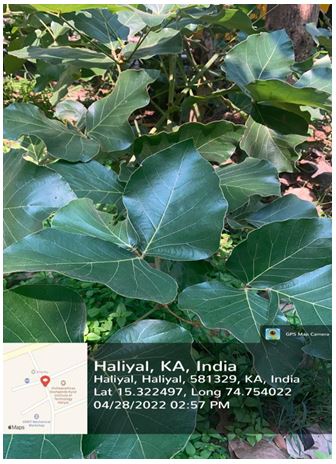KLS, VISHWANATHRAO DESHPANDE INSTITUTE OF TECHNOLOGY, HALIYAL
Knowledge is Power

Other Names: Utea monosperma, Bastard peak, Dhak, Tesu, Kimsuka, Raktapuspaka, Kulekhara, Kesudo, Khakharo, Khakhapado, Muttug, Muttuga, Muttala, Plasu, Camata, Plas, Chama Tha, Purasu, Paras, Moduga, Modugu, Chettu, Palaspapda
Uses of Palash leaves and Flowers:
- Skin diseases: According to Ayurveda, the paste of Palash seed helps to reduce itching in eczema and other skin disorders due to Kashaya (astringent) property if applied externally. Flowers and leaves of Palash are used to manage skin problems like acne, pimples,
It also improves digestion and increases sexual stamina when taken internally due to its Vrushya (aphrodisiac) property. - Vaginal Infection: Use the decoction prepared with Palash leaves to wash genital parts regularly to cure leukorrhea (white or yellowish vaginal discharge) and vaginal infection due to its Kashaya (astringent) property.
- Wound: The decoction of Palash seed also helps to check bleeding and promote fast healing due to its Kashaya (astringent) and Ropan (healing) properties.
- Retention of Urine: A decoction Palash flowers should be used to wash the pubic region regularly with so as to increase urine flow and helps to cure retention of urine due to Vata balancing nature.
- Jock Itch: Palash seeds help cure to Jock itch because it reduces excessive itching due to Kashaya (astringent) property and also improves healing process due to its Ropan(healing) nature. Palash seeds paste should be applied with lemon juice for getting a good result.
- Palash can be used to manage It inhibits the growth of diarrhoea-causing microorganisms (S. aureus and C. albicans) due to its antimicrobial activity. It also contains compounds known as tannins that have astringent property. This causes contraction of mucous membranes and reduces the discharge of essential substances through diarrhoea.
- Palash (Butea monosperma) can be used to manage The ethanolic extracts of Palash possess insulin-like activity and can thus regulate blood sugar levels.
- The extract of Palash flowers can be used to manage liver disorders. Studies state that Palash contains two antihepatotoxic flavonoids, butrin and isobutrin which increases the level of glutathione. Glutathione is an antioxidant that scavenges free radicals and prevents damage of liver cells.
- Palash is good to reduce the risk of kidney stones. It decreases calcium oxalate deposition which thereby reduces the number of stone deposits. Thus, it protects the kidneys and helps in its proper functioning.
- The topical application of Palash is beneficial for hair loss. It inhibits the damage of hair roots and improves hair growth. It also prevents damage to hair cells and improves hair texture.
KLS, VISHWANATHRAO DESHPANDE INSTITUTE OF TECHNOLOGY, HALIYAL is proudly powered by WordPress